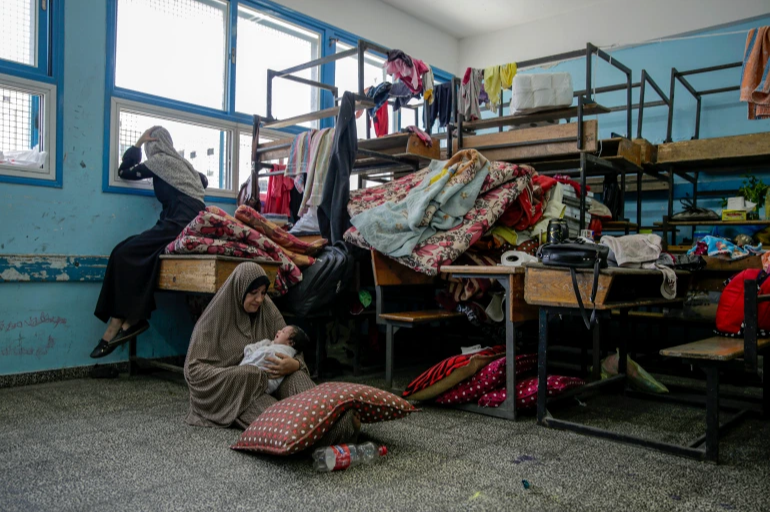
Shaher Barda’s family left their house in Gaza’s eastern front of Shujaiyah with only clothes on their back following intensive artillery and aerial bombardment [Mohammed Salem/Al Jazeera]
Gaza City, May 18 (RHC)-- Cradling her newborn baby Hasan on the floor of a classroom in Gaza City, her five other children flitting in and out, Suheir al-Arbeed lists the basic necessities they are lacking.
“We need food, clothes, duvets, mattresses and milk,” al-Arbeed, who gave birth two weeks ago, told Al Jazeera in a phone interview. “My back hurts from sleeping on a thin cover on the floor.” “I have to ask other people for diapers for my son,” she added. “I’m trying to breastfeed him but he’s still hungry and keeps crying.”
The 30-year-old was among one of the hundreds of families living in Gaza’s north and east who fled their homes overnight on Thursday, as heavy Israeli artillery shelling and aerial bombardment shook the ground under their feet.
The families escaped on foot, and hurried in the dark for several kilometres to the Gaza al-Jadeeda school, one of many run by the UNRWA, the UN agency for Palestinian refugees.
“There were no cars or transportation available,” al-Arbeed said, whose house is located in the Shujaiyah area in Gaza’s northeast. For Umm Jamal al-Attar, it is not the first time she and her family have been displaced. She told Al Jazeera that she spent 40 days taking shelter in a school during the 2014 Gaza war, in which Israel killed more than 2,100 Palestinians, including 1,462 civilians over a span of 50 days.
Umm Jamal, her husband and five children ran out of their house in Atatra, in the northern town of Beit Lahia, after a neighbouring house was targeted by an Israeli missile.
The attack killed Lamya al-Attar and her three children – Amir, Islam and Mohammed – who were living in an apartment on the second floor. “The Israelis were bombarding us with missiles and shelling. They also fired some sort of gas,” Umm Jamal said, adding that she has not been able to return home to get clothes or food.
“Our children need to be distracted with toys or anything that will take their minds off the bombing and the fear they’ve been living in,” she said. “The bombing is all they talk of now.”
Israel’s bombardment of the besieged Gaza Strip, now in its second week, has killed at least 201 Palestinians, including 58 children and 35 women, according to Gaza health authorities. More than 1,300 others have been wounded.
Israel has reported at least 10 people, including two children, killed in rocket attacks carried out by Hamas, the Palestinian group which rules Gaza.
The escalation was sparked last Monday when Israeli forces cracked down on protesters at the Al-Aqsa Mosque compound in occupied East Jerusalem, wounding hundreds of Palestinians. When Israel failed to meet a Hamas deadline to withdraw its forces from the area around the holy site, which is sacred to Muslims and Jews, Hamas fired several rockets towards Jerusalem. Shortly afterwards, Israel carried out air raids on Gaza.
According to the United Nations, more than 38,000 Palestinians in Gaza have been internally displaced, and are seeking shelter at 48 UNRWA schools across the coastal territory. The figure includes at least 2,500 people whose homes have been completely destroyed in the Israeli bombardment.
In a brief statement on Monday, UNRWA spokesman Adnan Abu Hassan said the agency has started to provide some basic needs for the displaced families. “We are in urgent need of support,” he said, referring to the Israeli closure on May 10 of the border crossing that is used to bring in humanitarian aid.
Majda Abu Karesh, a mother of seven whose house in Beit Lahia has been destroyed, said the families have had to fend for themselves regarding basic supplies.
“This is the fourth war we’ve had to seek shelter in a school,” she told Al Jazeera. “For five days now we’ve been sleeping on bare floors, and we haven’t received food or any supplies from UNRWA. There isn’t even clean drinking water, and the toilets are a mess.”

